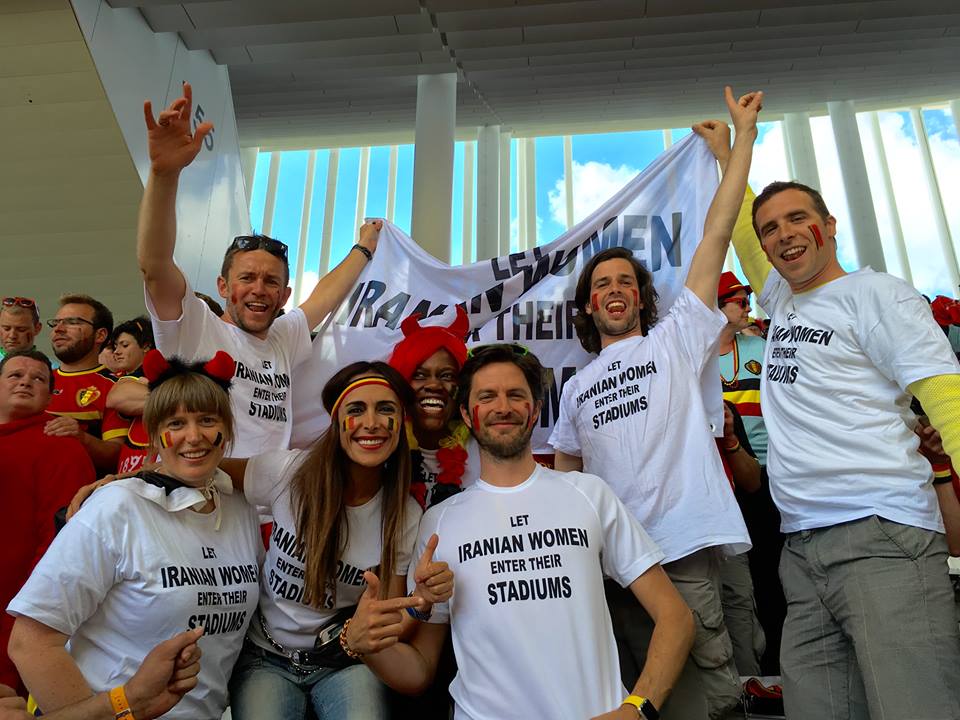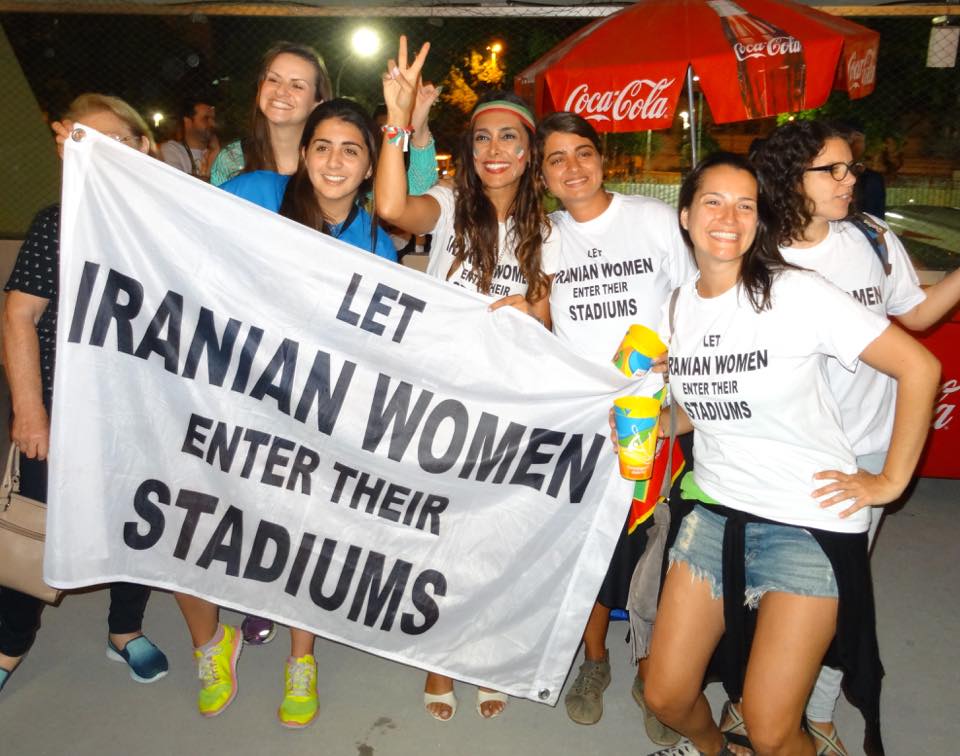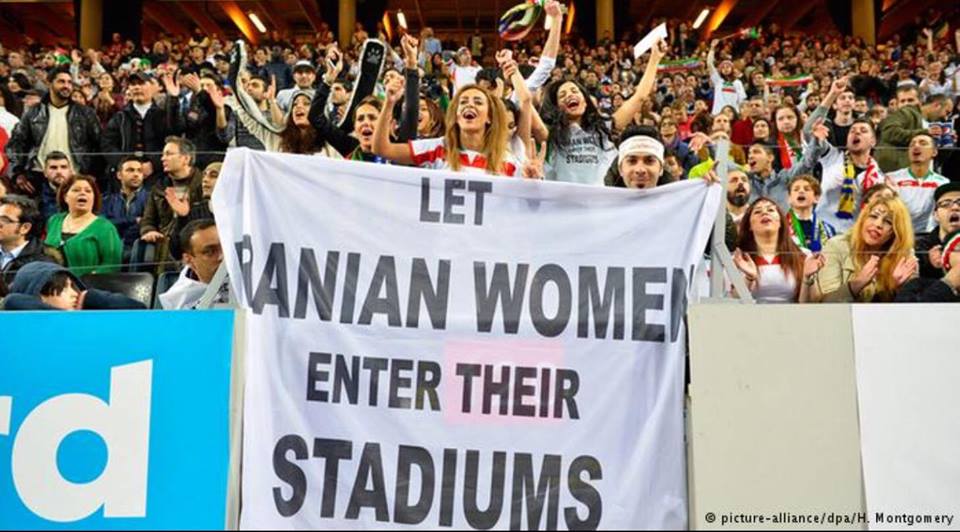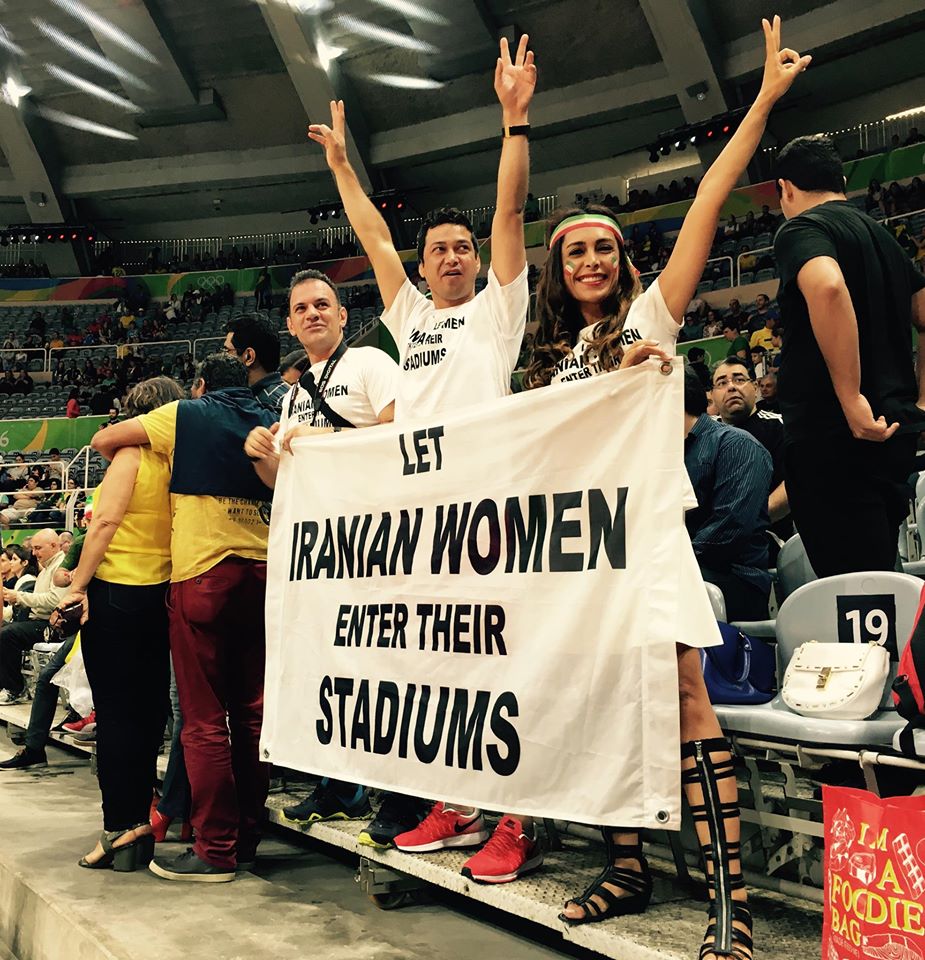“When I lived in Iran, [as] a little girl I wanted to go to the football stadium. But I couldn’t because I was a woman. Sports should bring people together; it should be everybody’s right to enter a stadium.”
On 14 August, images of an Iranian woman at the Rio Olympics began making its rounds on the internet. The woman was attending a volleyball match, where she sported a t-shirt and held a banner, both of read: “Let Iranian women enter their stadiums.”
Under International Olympic Committee rules, political statements at the games are banned. However, the woman stood her ground as security officials asked her to take down the banner and leave the stadium. She went on to hold her banner high at another volleyball game.
The woman was Darya Safai, the fonder of the “Let Iranian Women Enter Their Stadiums” campaign, which fights for the right of women in Iran to be able to attend all-male sporting events in their country. Iranian women have been banned from the all-male games since shortly after the Islamic revolution in 1979, and Darya believes that the stadium ban is a symbol for the “many discriminations” women in her country face on a daily basis.
Fleeing a dictatorship
Speaking to the IPF days after the photos of her went viral, Darya explained how her campaign came about.
“I grew up in the Islamic Republic of Iran after the revolution of 1979. There, I experienced first hand how it was to live as an oppressed woman in a religious dictatorship.”
Despite all odds, Darya graduated as a dentist from the University of Tehran. In 1999, her husband and her were actively involved in the student protests against the religious regime’s dictatorship. It was her involvement in those protests that got Darya imprisoned. When she was temporarily released on bail, she fled Iran with her husband and settled in Belgium.
Although it was tough, Darya explained that the experience had made her feel stronger in her battle for the rights of Iranian women. She also believes that having fled the regime, she is now in a better position to be able to give a voice to those women who are suppressed in Iran.“I know what it is to live as an oppressed Iranian woman. Now that I live in freedom, it gives me the strength and power to struggle for the rights of Iranian women whose voices are muted.”
Despite this, she expressed admiration for the women she left behind, adding that they were strong-willed and would continue fighting for their rights to the best of their ability.
“Iranian women have been protesting from the day the Islamic government wanted to implement women-unfriendly laws,” Darya said. “And they will keep fighting to gain their rights back, which were taken from them.”
Let Iranian women enter their stadiums
“When I lived in the Islamic Republic of Iran, already from when I was a little girl I wanted to go to the football stadium. But I couldn’t because I was a woman.”
Now that Darya lives in Belgium, she can watch the games as a free woman. She wants to use her position to campaign for the rights of Iranian women whose own voices are muted.
“I really enjoy the atmosphere of people cheering and supporting their team,” she said. “Sports should bring people together; it should be everybody’s right to enter a stadium.”
In 2014, Darya officially started the “Let Iranian Women Enter Their Stadiums” campaign. Although the campaign is primarily based on pushing for women to be able to attend sporting games, Darya explained that she uses the stadium ban as a “symbol of one of the many discriminations Iranian women are confronted with on a daily basis”.

Darya Safai and supporters at football game [Image credit: Let Iranian Women Enter Their Stadiums Campaign]
“Thanks to my actions, I have had contact at the highest echelons of FIFA and FIVB to bring up the issue.”
Taking the issue to the international sporting community
In February 2015, Darya wrote a letter to Sepp Blatter, who was President of FIFA at the time. She explained what Iranian women were going through when it came to sports and outlined what she expected FIFA to do in response to this.
According to Darya, FIFA is not complying with its own regulations when it comes to Iran. Article 3 of FIFA’s status notes: “Discrimination of any kind against a country, private person or group of people on account of race, skin colour, ethnic, national or social origin, gender, language, religion, political opinion or any other opinion, wealth, birth or any other status, sexual orientation or any other reason is strictly prohibited and punishable by suspension or expulsion.”
Darya’s letter to FIFA has since been signed by more than 200 prominent Iranian academics, human rights activists, political prisoners and artists.
Progress within the country
Although there have been a few discussions about the stadium ban within Iran, little action has been taken. However, Darya still sees this as a step in the right direction. She believes that it is good that people are at least talking about the issue and that without discussions, nothing would change.
“Making people aware about this problem outside the country is also very important. Now the problem is known worldwide; before it wasn’t. This is how we can put pressure on the International Sports Federations.”
Darya said: “Until now there is no change, but we have to keep hoping and fighting against this discrimination.”
The role of young Iranians
Darya said that she gets a lot of support from both Iranian women and men inside Iran. She said that many have told her how much they appreciate what she is doing and often contact her on social media to thank her for being their voice.
“Iranian women are waiting behind the closed doors of the stadium. They are always trying, even if they can wind up in jail.”
However, Darya emphasised that while her actions had brought the issue into the international arena, Iranian women now need the world to begin caring and to begin putting pressure on the regime.
She also emphasised that the young generation of Iranians have a huge role to play in bringing about change in their country.
“Young Iranians should keep on fighting to gain their rights back. They should never give up, even when the road is long and exhausting. If you keep fighting, there will be a day that change will arrive.”
In particular, she hoped that young Iranian men would show their female counterparts support in their struggle. She urged them to look at history and realise that political, cultural and industrial improvement heavily relies on equal rights for every citizen – and that no society can develop as long as systematic discrimination of women continues.
“Personally, even if my goals can’t be reached fast, I know I am on the right way and that gives me a lot of power. I wish the same for all Iranian women.”
To find out more about the “Let Iranian Women Enter Their Stadiums” campaign, like them on Facebook and follow them on Twitter.




